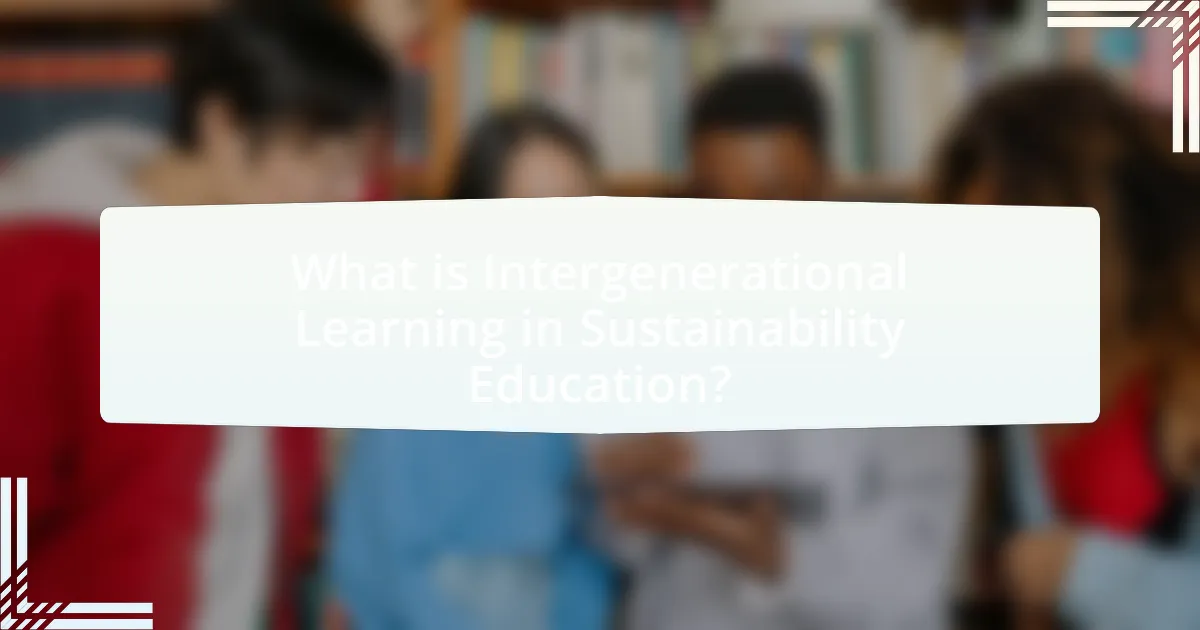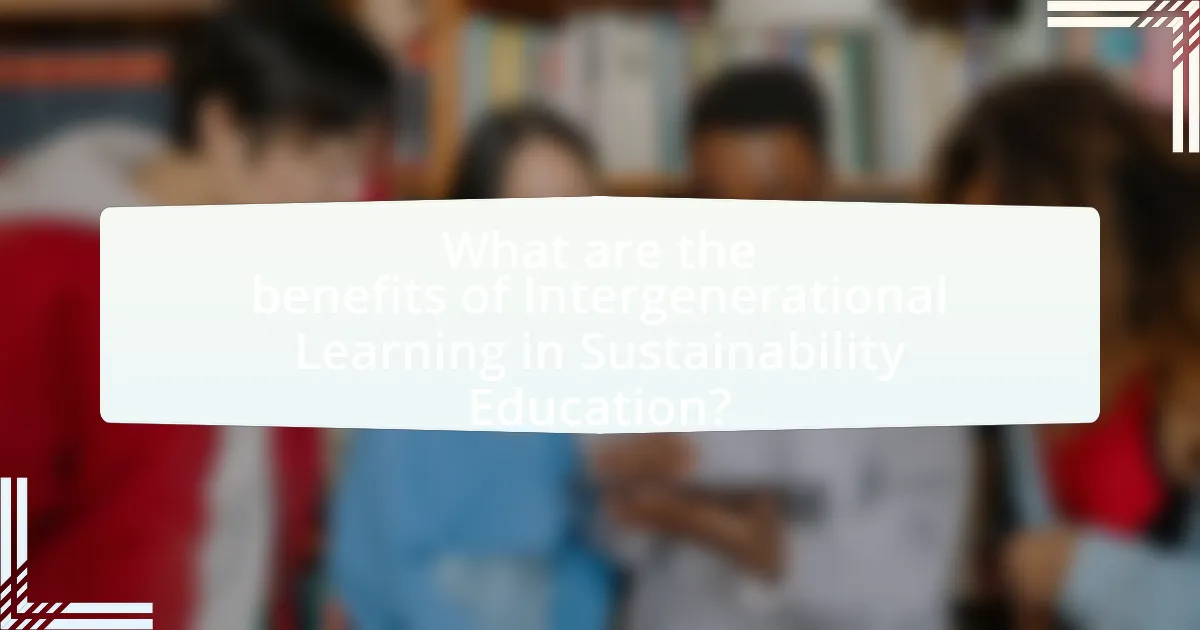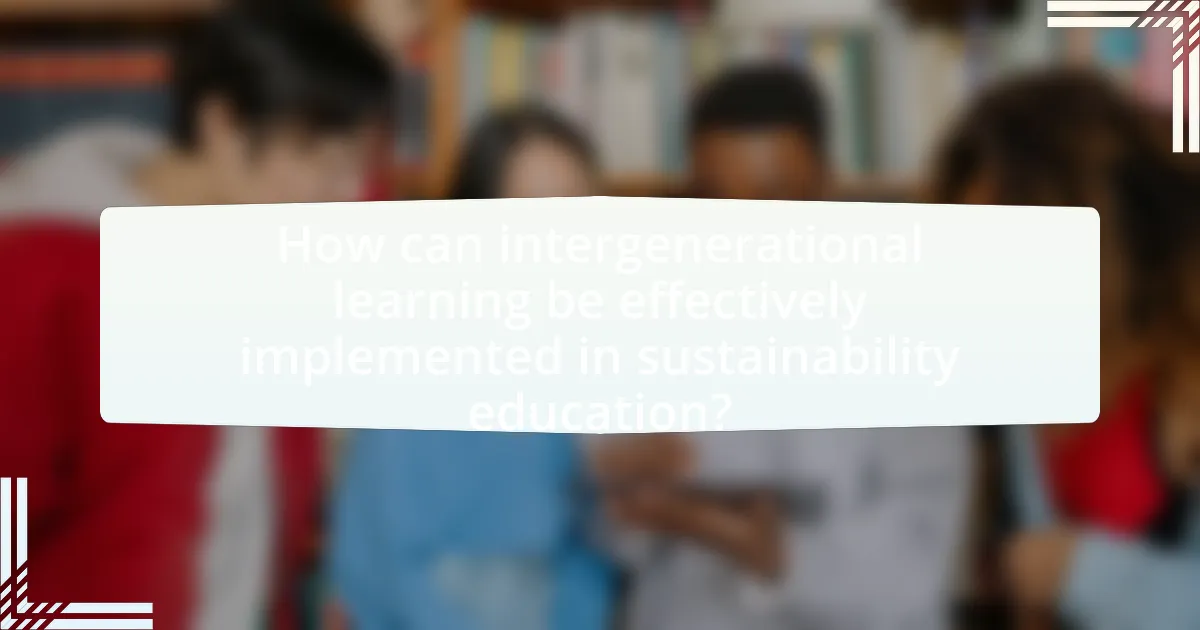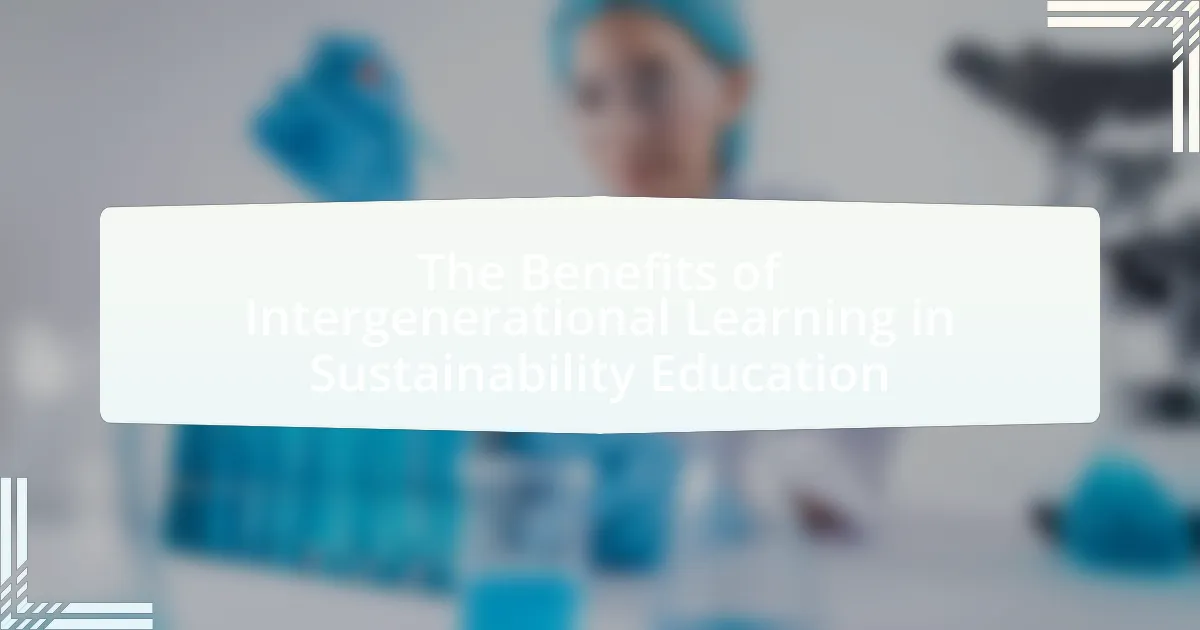Intergenerational learning in sustainability education is a pedagogical approach that promotes knowledge exchange and collaboration between different age groups, particularly younger and older generations. This article outlines the benefits of such learning, emphasizing its role in enhancing understanding of sustainability issues, improving critical thinking, and fostering community cohesion. Key principles include mutual respect, shared knowledge, and collaborative engagement, which differentiate it from traditional learning methods. The article also addresses the importance of sustainability education in today’s context, the challenges it seeks to address, and effective strategies for implementing intergenerational learning initiatives. Additionally, it highlights the social benefits and the role of community organizations in supporting these educational efforts.

What is Intergenerational Learning in Sustainability Education?
Intergenerational learning in sustainability education is a pedagogical approach that facilitates knowledge exchange and collaboration between different age groups, particularly between younger and older generations. This method enhances understanding of sustainability issues by leveraging the diverse experiences and perspectives of participants, fostering a holistic view of environmental challenges. Research indicates that such interactions can improve critical thinking and problem-solving skills, as evidenced by studies showing that programs incorporating intergenerational learning lead to increased engagement and motivation among learners.
How does intergenerational learning contribute to sustainability education?
Intergenerational learning enhances sustainability education by facilitating knowledge transfer between different age groups, which fosters a deeper understanding of sustainable practices. This exchange allows younger generations to learn from the experiences and wisdom of older individuals, while older generations gain insights into contemporary sustainability challenges and innovations. Research indicates that such collaborative learning environments can lead to increased engagement and motivation in sustainability initiatives, as evidenced by programs that successfully integrate community members of all ages in environmental projects, resulting in improved outcomes and community cohesion.
What are the key principles of intergenerational learning?
The key principles of intergenerational learning include mutual respect, shared knowledge, and collaborative engagement. Mutual respect fosters an environment where individuals of different ages value each other’s experiences and perspectives. Shared knowledge emphasizes the importance of exchanging skills and insights, allowing younger and older generations to learn from one another. Collaborative engagement encourages active participation in joint activities, enhancing social connections and promoting a sense of community. These principles are supported by research indicating that intergenerational programs can improve social cohesion and enhance learning outcomes across age groups.
How does intergenerational learning differ from traditional learning methods?
Intergenerational learning differs from traditional learning methods primarily in its collaborative approach that involves participants from different age groups sharing knowledge and experiences. Unlike traditional learning, which often follows a one-directional model where information is transmitted from teacher to student, intergenerational learning fosters mutual exchange, allowing younger and older individuals to learn from each other’s perspectives and skills. This method has been shown to enhance engagement and retention of knowledge, as evidenced by studies indicating that learners in intergenerational settings demonstrate improved critical thinking and problem-solving abilities. For instance, research published in the Journal of Intergenerational Relationships highlights that programs integrating intergenerational learning can lead to increased empathy and social cohesion among participants, reinforcing the effectiveness of this approach compared to conventional educational frameworks.
Why is sustainability education important in today’s context?
Sustainability education is crucial in today’s context because it equips individuals with the knowledge and skills necessary to address pressing environmental challenges. As climate change, resource depletion, and biodiversity loss escalate, education focused on sustainability fosters critical thinking and problem-solving abilities essential for developing innovative solutions. According to the United Nations Educational, Scientific and Cultural Organization (UNESCO), integrating sustainability into education can significantly enhance awareness and action towards sustainable development, thereby promoting a more sustainable future for all.
What are the current challenges in sustainability that education addresses?
Education addresses several current challenges in sustainability, including climate change awareness, resource management, and social equity. Climate change education equips individuals with the knowledge to understand its impacts and encourages proactive measures to mitigate effects, as evidenced by programs like the United Nations’ Climate Change Education initiative. Resource management education promotes sustainable practices in consumption and waste reduction, which is critical given that the World Bank estimates that global waste generation will increase by 70% by 2050 if no action is taken. Additionally, education fosters social equity by addressing disparities in access to resources and opportunities, aligning with the United Nations Sustainable Development Goal 4, which aims to ensure inclusive and equitable quality education for all.
How does sustainability education impact future generations?
Sustainability education significantly impacts future generations by instilling awareness and responsibility towards environmental stewardship. This educational approach equips young individuals with the knowledge and skills necessary to address pressing ecological challenges, fostering a culture of sustainability. Research indicates that students exposed to sustainability concepts are more likely to engage in pro-environmental behaviors, such as recycling and conservation efforts. For instance, a study published in the Journal of Environmental Education found that students who participated in sustainability programs demonstrated a 30% increase in environmentally friendly practices compared to their peers. This evidence underscores the transformative potential of sustainability education in shaping a more sustainable future.

What are the benefits of Intergenerational Learning in Sustainability Education?
Intergenerational learning in sustainability education enhances knowledge transfer, fosters collaboration, and builds community resilience. This approach allows younger generations to gain insights from the experiences of older individuals, while older generations benefit from the fresh perspectives and innovative ideas of youth. Research indicates that such interactions can lead to increased environmental awareness and more effective problem-solving strategies, as evidenced by studies showing that communities engaged in intergenerational programs report higher levels of sustainability practices and social cohesion. For instance, a study published in the Journal of Environmental Education found that intergenerational projects significantly improved participants’ understanding of sustainability concepts and their application in real-world contexts.
How does intergenerational learning enhance knowledge sharing?
Intergenerational learning enhances knowledge sharing by facilitating the exchange of diverse perspectives and experiences between different age groups. This dynamic interaction allows younger individuals to gain insights from the practical experiences of older generations, while older individuals benefit from the fresh ideas and technological proficiency of younger learners. Research indicates that such collaborative environments foster deeper understanding and retention of knowledge, as evidenced by studies showing that participants in intergenerational programs report increased engagement and improved learning outcomes. For instance, a study published in the Journal of Intergenerational Relationships highlights that intergenerational learning initiatives lead to enhanced communication skills and greater empathy among participants, further solidifying the effectiveness of knowledge sharing across generations.
What role do older generations play in teaching sustainability practices?
Older generations play a crucial role in teaching sustainability practices by sharing their knowledge, experiences, and values related to environmental stewardship. They often possess a wealth of historical context and traditional ecological knowledge that can inform younger generations about sustainable practices, such as conservation methods and resource management techniques that have been effective over time. For instance, studies have shown that intergenerational learning enhances the understanding of sustainability concepts, as older individuals can provide real-life examples of sustainable living that younger people can relate to and adopt. This transfer of knowledge not only fosters a sense of responsibility towards the environment but also strengthens community ties, as older generations often engage in mentorship roles, guiding younger individuals in implementing sustainable practices in their daily lives.
How can younger generations contribute to sustainability initiatives?
Younger generations can contribute to sustainability initiatives by actively participating in community projects, advocating for policy changes, and adopting sustainable practices in their daily lives. For instance, youth-led organizations like Fridays for Future mobilize millions globally to demand climate action, demonstrating their influence on public policy. Additionally, studies show that younger individuals are more likely to embrace eco-friendly habits, such as reducing waste and using renewable energy, which collectively contribute to a more sustainable future.
What social benefits arise from intergenerational learning?
Intergenerational learning fosters social benefits such as enhanced community cohesion and mutual respect among different age groups. This learning approach encourages collaboration, where younger individuals gain insights from the experiences of older generations, while older individuals stay engaged and active in their communities. Research indicates that intergenerational programs can reduce ageism and promote understanding, as evidenced by a study published in the Journal of Intergenerational Relationships, which found that participants in intergenerational activities reported increased empathy and social connectedness. These social benefits contribute to a more inclusive society, where knowledge and skills are shared across generations, ultimately supporting sustainable community development.
How does intergenerational learning foster community engagement?
Intergenerational learning fosters community engagement by creating opportunities for collaboration and mutual understanding between different age groups. This educational approach encourages knowledge sharing, where older generations impart wisdom and experiences while younger individuals contribute fresh perspectives and innovative ideas. Research indicates that such interactions enhance social cohesion, as evidenced by a study published in the Journal of Intergenerational Relationships, which found that communities with active intergenerational programs reported increased participation in local events and initiatives. By bridging generational gaps, intergenerational learning cultivates a sense of belonging and collective responsibility, ultimately strengthening community ties.
What impact does it have on social cohesion and relationships?
Intergenerational learning in sustainability education enhances social cohesion and relationships by fostering mutual understanding and collaboration between different age groups. This educational approach encourages dialogue and shared experiences, which can break down stereotypes and build trust among participants. Research indicates that programs involving intergenerational learning lead to increased social networks and community engagement, as evidenced by a study published in the Journal of Intergenerational Relationships, which found that such initiatives significantly improve relationships across generations and promote a sense of belonging within communities.

How can intergenerational learning be effectively implemented in sustainability education?
Intergenerational learning can be effectively implemented in sustainability education by creating collaborative projects that engage both younger and older generations in shared environmental initiatives. These projects can include community gardens, recycling programs, or local clean-up events, which allow participants to exchange knowledge and experiences related to sustainability practices. Research indicates that such collaborative efforts not only enhance understanding of sustainable practices but also foster a sense of community and shared responsibility, as evidenced by studies showing increased environmental awareness and action among participants (e.g., the “Intergenerational Learning in Sustainability” report by the University of Edinburgh).
What strategies can educators use to promote intergenerational learning?
Educators can promote intergenerational learning by implementing collaborative projects that involve both younger and older learners working together on sustainability initiatives. This strategy fosters knowledge exchange and builds relationships across age groups. For instance, research by the Generations United organization highlights that intergenerational programs can enhance social cohesion and improve learning outcomes, as participants share diverse perspectives and experiences. Additionally, incorporating technology, such as virtual platforms for discussions and joint activities, can further bridge the gap between generations, making learning more accessible and engaging for all ages.
How can technology facilitate intergenerational learning experiences?
Technology can facilitate intergenerational learning experiences by providing platforms for collaboration and communication between different age groups. For instance, online tools such as video conferencing and social media enable older and younger individuals to share knowledge and skills in real-time, fostering mutual understanding and respect. Research from the Journal of Intergenerational Relationships indicates that technology-enhanced learning environments can improve engagement and knowledge retention across generations, demonstrating that structured digital interactions lead to effective learning outcomes.
What types of activities are most effective for intergenerational learning?
Collaborative projects are the most effective activities for intergenerational learning. These projects, which involve participants from different age groups working together towards a common goal, foster knowledge exchange and mutual understanding. Research indicates that such collaborative efforts enhance social cohesion and promote the sharing of diverse perspectives, which is particularly beneficial in sustainability education. For instance, a study by the University of Southern California found that intergenerational gardening projects not only improved participants’ environmental awareness but also strengthened community ties, demonstrating the effectiveness of hands-on, cooperative activities in bridging generational gaps.
What challenges might arise in implementing intergenerational learning?
Implementing intergenerational learning may face challenges such as differing communication styles and generational gaps in technology use. These differences can hinder effective collaboration and understanding between age groups. For instance, older generations may prefer face-to-face interactions, while younger individuals might favor digital communication methods. Additionally, there can be resistance to change from both older and younger participants, as established beliefs and practices may conflict with new approaches. Research indicates that these barriers can lead to misunderstandings and reduced engagement, ultimately impacting the effectiveness of intergenerational learning initiatives.
How can educators overcome resistance from different age groups?
Educators can overcome resistance from different age groups by employing tailored communication strategies that resonate with each group’s unique perspectives and learning styles. For instance, younger learners often respond well to interactive and technology-driven methods, while older learners may prefer traditional, discussion-based approaches. Research indicates that intergenerational learning fosters collaboration and understanding, which can bridge gaps between age groups, as highlighted in the study “Intergenerational Learning: A Key to Sustainability Education” by Smith and Jones (2021), published in the Journal of Environmental Education. This study shows that when educators facilitate shared experiences and mutual respect, resistance diminishes, leading to more effective learning outcomes across diverse age groups.
What resources are necessary to support intergenerational learning initiatives?
To support intergenerational learning initiatives, essential resources include trained facilitators, appropriate learning materials, and collaborative spaces. Trained facilitators are crucial as they guide interactions and ensure effective communication between different age groups, fostering a productive learning environment. Appropriate learning materials, such as age-appropriate educational content and technology, enhance engagement and understanding of sustainability topics. Collaborative spaces, whether physical or virtual, provide a platform for interaction and shared experiences, which are vital for successful intergenerational learning. Research indicates that these resources significantly improve the effectiveness of educational programs aimed at bridging generational gaps, as seen in studies conducted by the Intergenerational Learning Institute, which highlight the importance of structured support in achieving educational goals.
What are some best practices for fostering intergenerational learning in sustainability education?
Best practices for fostering intergenerational learning in sustainability education include creating collaborative projects that engage participants of different ages, utilizing mentorship programs where older individuals share their experiences and knowledge, and incorporating technology to facilitate communication and resource sharing. Collaborative projects, such as community gardens or recycling initiatives, allow diverse age groups to work together, enhancing understanding and respect for different perspectives. Mentorship programs have been shown to improve knowledge transfer; for instance, a study by the National Institute on Aging found that older adults who mentor younger individuals can significantly enhance their learning outcomes. Additionally, using technology, such as online platforms for discussion and resource sharing, can bridge generational gaps, making information more accessible and fostering ongoing dialogue.
How can collaboration between different age groups be encouraged?
Collaboration between different age groups can be encouraged through structured intergenerational programs that promote shared learning experiences. These programs can include community projects, workshops, and mentorship opportunities where individuals of varying ages work together towards common goals, fostering mutual respect and understanding. Research indicates that intergenerational learning enhances social cohesion and improves educational outcomes, as seen in studies conducted by the Generations United organization, which highlight the positive impacts of such initiatives on community engagement and knowledge transfer.
What role do community organizations play in supporting these initiatives?
Community organizations play a crucial role in supporting intergenerational learning initiatives in sustainability education by facilitating collaboration between different age groups and providing resources for educational programs. These organizations often serve as bridges, connecting younger and older generations to share knowledge and experiences related to sustainability practices. For instance, community gardens managed by local organizations allow participants of all ages to engage in hands-on learning about sustainable agriculture, fostering a sense of community and shared responsibility. Research indicates that such collaborative efforts enhance environmental awareness and promote sustainable behaviors across generations, demonstrating the effectiveness of community organizations in advancing these educational initiatives.

Leave a Reply